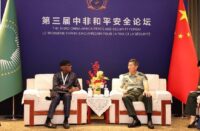Peace and war are matters of insecurity. Living with insecurity is the only security, perhaps for those who studied war! Even in the most hospitable circumstances, the human condition is precarious because we are all unavoidably exposed. Human nature is flawed, and perfect security cannot exist in any human society. Yet to be forgotten even when you may not like him is Hobbes’ ‘state of nature,’ every human being is a potential threat because the struggle for survival in a world of limited resources is a “war of all against all.” Hobbes thought that putting a government in place was an excellent way of guaranteeing security!
In a world without a government to enforce order – a condition that Hobbes calls the state of nature – every human must be vigilant against threats to survival. A world without government, he claims, forces humanity into a constant state of war because there is no way to trust in the excellent or peaceful intentions of others. We must always be on our guard lest we be attacked. This condition – in which no ruler or judge can resolve disputes and establish security – is anarchy. In an anarchic world, Hobbes argues that our lives must revolve around survival, leaving no time for agriculture, the arts or sciences, conditions of anarchy; Hobbes says, “the life of man [is] solitary, poor, nasty, brutish and short.”
But does having a government in the last 20 years make a difference? This is because, and according to me, the Nigerian Boko Haram insurgency underscores the Hobbesian thesis of man’s aggressiveness in the state of nature that requires the leviathan’s intervention. The Nigerian government’s failure to provide public goods led to the emergence of the Boko Haram insurgency. The citizens contest their rights to life (now in danger), withdrawing their loyalty and support from the government and the armed forces. A praxis explains the power shift from the Nigerian government to the identified local group (Boko Haram). The shift accompanies ongoing violence between soldiers and the insurgents, resulting in mass civilian casualties, genocide, systemic rape, and unquantifiable property destruction fostering human insecurity. The above narrative makes the statement relevant that studying and knowing how to live with insecurity is the only security!
Insecurity is pervasive in the international realm. For instance, the international system is anarchic, and no single authority can remit uncertainty. We move from the dynamics of abuse of power as we saw in Darfur, where Sudanese President Omar al-Bashir was charged by the International Criminal Court (ICC) with war crimes against humanity. The violence also forced some 2.5 million people − mostly farmers and villagers from non-Arab groups – to flee their homes. So was the American-led invasion of Iraq in 2003 to the insecurity creation of intervention and collision of the value of security paradigms in human, national and geocentric systems; the interventions in Iraq (1990), Bosnia (1995), and Afghanistan (2001) were intended to preserve the territorial status quo and restore sovereign control to legitimate governments. In Kuwait, Sarajevo, and Kabul. Intervention in Kosovo (1999) was intended to protect the Kosovar (Albanian) minority even at the risk of partitioning the (rump) federal Yugoslav state (Serbia-Montenegro). All are empirical evidence of insecurity globally. Issues of the ongoing killings by Boko Haram and collaboration of the insurgents with the new formation of the Islamic State West Africa Province (ISWAP) and its expanding activities in the West African sub-region, where Boko Haram killed the President of Chad recently, forcefully explaining the failure of the leviathan to protect citizens and himself! In developing countries, what is more is the powerful justification for our new concern that how to live with insecurity is the only security, at least known in the West African sub-region.
The events we saw from the first, second and ongoing Cold War suggest that war is ingrained in all of us. Yes, there may be no scientific proof or empirical evidence, but it is not the case that when science speaks, the truth comes out! One scientific theory, after clinical trials and proof of evidence, which suggests that all swans are black, is no longer valid. At least there are now brown swans found in Igbotako, Ondo State! It is not the case that war is new to any continent or the entire human generation in the geocentric system.
Still, it confirmed that those born after 1967 (the Biafra War) have never experienced war and have been taking caution in the narrative left for them by their parents. Yes, more stories of war every day and fresh narratives of human insecurity also come from the Manchuria crisis (1931) and the Abyssinia crisis (1935) case of Iraq’s intervention for national security (1991); the cases of Bosnia (1995) and Afghanistan’s intervention for human security (2001); the case of the Kosovo (1995) intervention after R2P; the case of Darfur (2008). Again, the case of Russia in Ukraine. If we are looking for peace in those countries, it is also the case that those wars have not led to peace, and if we are to end the war in those countries, it is not the case that absolute peace has now returned! That may be why war is an unavoidable part of human existence.
A Harvard psychologist Stephen Pinker saw not too clear a picture when he said, “If the idea that war is part of human nature is not scientifically supported, alternative futures open. If more people work for prevention, the eventual eradication of war is a definite theoretical possibility.”
What is impossible is that those who want peace think they do not need war! Those who think we can stay in a world full of peace for as long as we keep praying, the good Lord will grant us that much desire for peace, is not only psychologically playing, for at least they are theorising!
It will certainly not be possible to prevent ECOWAS from military action in Niger Republic because war is ingrained in everyone, and most soldiers and officers recruited for the military actions were born post-1967! The desire and expectations are high, let’s not argue the political celebration of winning for now. Still, at least in the classical days, hegemonic leaders who fought and won wars were celebrated, and it is not the case that these feelings have left us.
ECOWAS may create peace in Niger Republic starting with war, but perhaps not in the short run. It could be argued that never again will there be a military overthrow of a democratically elected government, at least in the eye of democrats, if the military action succeeds. But is ECOWAS going to the Niger Republic to fight a war? We are asking because of democratic peace theory (apologies to Immanuel Kent). Liberals and Republicans will not go to war with another liberal. They will hesitate to engage in armed conflict.
It could also be the case that democratic peace theory dies with Immanuel Kent!
To ECOWAS, whatever the pains of intervention, the need for community alliance is imperative to human security, and the military junta cannot provide that much top level of security in the value stick of the apparatus of Government in the Niger Republic in contemporary times. States are considered most secure when war is unthinkable between them. Interestingly, the term unthinkable appears in policy discourse with nearly the opposite meaning, referring to wars that are eminently possible but horrifying to contemplate, such as war with a nuclear Iran. I only hope there is no nuclear weapon coming from anywhere in this community affairs, or is Russia holding meetings? For ECOWAS, it is a matter of “we-feeling” on the part of the participating countries or an imperativeness for security alliance! ECOWAS is addressing dependable expectations of peaceful change!
Those who do not support the military action argued that intervention violates Article 2 (4) non-use of force and, more specifically, Article 2 (7) of the UN constitution for non-intervention in the internal affairs of another country to which all ECOWAS countries are members. The challenge here is to ask whether the UN security council, by Article 51, have not transferred her power to ECOWAS concerning regional peace to ‘prevent and punish’ where there is genocide and breach of international peace. The question to ECOWAS is, do we have such in Niger Republic? ECOWAS will breach those chapters as the US did in Iraq! Again, one may ask the UN what became of resolution ES‑11/4 concerning Ukraine, passed in March 2022 and adopted on 7th April 2022, with overwhelming votes of 143 in favour and five against 35 abstaining, demanding that Russia withdraw its forces from Ukraine. The intention is to give way to resolving emerging crises. The resolution demanded “immediately, completely and unconditionally withdraw” The council considered the invasion a violation of Ukraine’s territorial integrity and sovereignty. The question remains “Is the Niger Republic a sovereign State such that military action is made impossible?
Is sovereignty not hypocrisy? Apology to Steven Krasner.
BY: Ibrahim
SOURCE :The Sun













